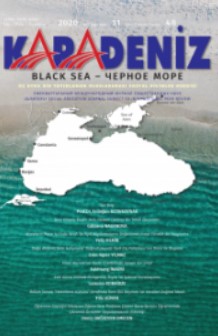KARAY TÜRKLERİNİN YAKARI METİNLERİNDE KUDÜS
JERUSALEM IN PLEA TEXTS OF KARAI TURKS
Author(s): Fatih ŞayhanSubject(s): Semiotics / Semiology, Comparative Studies of Religion, History of Judaism, Theory of Literature, History of Religion
Published by: Kültür Ajans Tanıtım ve Organizasyon
Keywords: Karai Turks; History of Religions; Karaite Sect; Plea Texts; Jerusalem;
Summary/Abstract: Thought to be the continuation of the Caspian kaganate and having accepted the Karaism sect of Judaism in the IXth century, Karaite Turks, today, live in in Crimea, Lithuania. Poland, Egypt, Israel, America, Switzerland, France, England, Belgium, North Africa, Spain, Iran, Armenia, the Caucasus, South Russia and İstanbul in dispersed communities. After UNESCO's listing the language of the Black Sea Turks, whose population has decreased due to political, geographical, religious, economic and sociological reasons and who are in danger of losing their language and culture, the world of science, and particularly cultural scientists and linguists, have started to show interest in the Caribbean Turks. Karai Turks wrote their written texts with Aramaic and Hebrew letters as a matter of belief. The texts in question are magazines they call "mecuma", including poetic and literary narratives, thought to be the transmitters of culture, as well as the texts of prayer, in which they show their stances against life. In the religious sense, in accordance with the teachings of the Karaism sect, the Karai Turks took only the written Torah and did not accept the Talmut and the Rabbi law. In this respect, they have established a belief-centered existence area based on the teachings of the Torah. In this context, "Plea", "Karai Prays" and "Çakun Lahaş" written in Hebrew letters are the leading texts of the admonition of the Karaite Turks. The text called “Çakun Lahaş” has been transcipted from Hebrew letters to Latin letters by us based on translation texts. In these texts, “Jerusalem” is mentioned as “beyt mikdas”, “saint mikdas”, “Sion” and “Jerusalayim / Jerusalem” and is referred to as “holy temple”. In this study, starting from the texts of “Çakun Lahaş” and “Plea”, the historical importance of Jerusalem for Karai Turks and its place in terms of religion will be emphasized and the references of Jerusalem as a system of values on the history of religions will be examined in a semiotic context.
Journal: Karadeniz Uluslararası Bilimsel Dergi
- Issue Year: 2020
- Issue No: 48
- Page Range: 291-302
- Page Count: 12
- Language: Turkish

